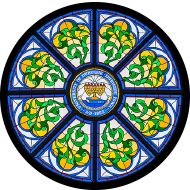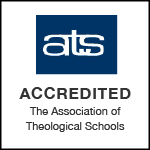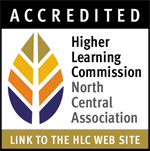Accreditation and Educational Effectiveness
The University of Dubuque Theological Seminary is accredited by the Commission on Accrediting of the Association of Theological Schools in the United States and Canada, with the following degree programs are approved: Master of Arts in Mission and Discipleship, Master of Divinity, and Doctor of Ministry. Approved for a Comprehensive Distance Education Program. The Master of Arts in Christian Leadership degree is accredited by the Higher Learning Commission through the University of Dubuque.
The seminary is a member of the Committee on Theological Education of the Presbyterian Church (U.S.A.) and is approved by the University Senate of the United Methodist Church Division of Higher Education and Ministry for residential studies. It is a member of the Association for Clinical Pastoral Education. The MDiv degree from UDTS is accepted as a preparation for ordination by most denominations.
The Commission on Accrediting of the Association of Theological Schools in the United States and Canada,
10 Summit Park Drive
Pittsburgh, PA 15275
412.788.6505
www.ats.edu
and
The Higher Learning Commission/ North Central Association of Colleges and Schools (NCA)
30 North LaSalle Street, Suite 240
Chicago, IL 60602
312.263.0456
Educational Effectiveness
The University of Dubuque Theological Seminary is committed to serving the one God - Father, Son, and Holy Spirit - and forming God's people for servant leadership in ministry and mission.
The seminary regularly measures our educational effectiveness through a number of tools, including the ATS Graduating Student Questionnaire, matriculation/graduation rates, and placement.
Matriculation/Graduation Rate:
79% of MDiv students who matriculated in Fall 2014 graduated by May 2020.
Placement Rate:
92% of the 2019-2020 graduates were placed either in a ministry setting or further education four months after graduation.
ATS Graduating Student Questionnaire:
Below are comparisons of significant scores for UDTS and all ATS accredited schools that use the Graduating Student Questionnaire.
|
MEASURE OF EDUCATIONAL EFFECTIVENESS AND PERSONAL GROWTH |
||||
|
UDTS vs ALL THEOLOGICAL SCHOOLS 2019-20 |
||||
|
|
UDTS |
All Theological Schools |
||
|
By Degree Program and Educational Context |
Residential |
Distance |
All ATS |
PC(USA) |
|
|
N = 2 |
N = 19 |
N = 4,590 |
N = 244 |
|
|
Avg |
Avg |
Avg |
Avg |
|
Empathy for the poor and oppressed |
4.0 |
4.4 |
4.1 |
4.1 |
|
Ability to pray |
5.0 |
4.6 |
3.7 |
3.3 |
|
Concern about social justice |
4.5 |
4.3 |
4.0 |
4.2 |
|
Enthusiasm for learning |
4.5 |
4.6 |
4.3 |
4.1 |
|
Insight into troubles of others |
4.5 |
4.4 |
4.1 |
4.0 |
|
Desire to become an authority in my field |
4.5 |
4.2 |
4.0 |
3.8 |
|
Trust in God |
5.0 |
4.6 |
4.2 |
3.8 |
|
Self-discipline and focus |
4.0 |
4.4 |
4.2 |
3.8 |
|
Respect for other religious traditions |
4.5 |
4.6 |
4.1 |
4.1 |
|
Respect for my own religious tradition |
4.5 |
4.5 |
4.3 |
4.0 |
|
Ability to live one's faith in daily life |
5.0 |
4.6 |
4.1 |
3.7 |
|
Clarity of vocational goals |
4.5 |
4.1 |
4.90 |
3.8 |
|
Self-confidence |
5.0 |
4.3 |
4.1 |
3.9 |
|
Self-knowledge |
5.0 |
4.5 |
4.2 |
4.0 |
|
Strength of spiritual life |
5.0 |
4.7 |
4.0 |
3.5 |
|
1 - Not at all effective | 2 - Not very effective | 3 - Somewhat effective | 4 - Effective | 5 - Very effective |
||||
|
EDUCATIONAL EFFECTIVENESS IN FACILITATING SKILL AREAS |
||||
|
UDTS VS. ALL THEOLOGICAL SCHOOLS 2019-20 |
||||
|
|
UDTS |
All Theological Schools | ||
|
|
Residential |
Distance
|
All ATS |
PC(USA) |
|
By Degree Program and Skill Areas |
N = 2 |
N = 19 |
N = 4,590 |
N = 244 |
|
|
Avg |
Avg |
Avg |
Avg |
|
Ability to preach well |
5.0 |
4.6 |
4.0 |
4.0 |
|
Ability to use and interpret Scripture |
5.0 |
4.9 |
4.4 |
4.3 |
|
Knowledge of church polity |
4.5 |
4.6 |
3.8 |
3.8 |
|
Ability to give spiritual direction |
4.5 |
4.3 |
3.9 |
3.5 |
|
Ability to teach well |
4.5 |
4.3 |
4.1 |
3.9 |
|
Knowledge of church doctrine and history |
5.0 |
4.8 |
4.2 |
4.0 |
|
Ability to lead others |
4.5 |
4.5 |
4.0 |
3.8 |
|
Ability to conduct worship |
5.0 |
4.7 |
3.8 |
4.0 |
|
Ability to interact effectively with those of religious traditions other than my own |
4.0 |
4.4 |
4.0 |
4.0 |
|
Ability to work effectively within my own religious tradition |
4.0 |
4.7 |
4.2 |
4.1 |
|
Ability to relate social issues to faith |
4.5 |
4.4 |
4.2 |
4.3 |
|
Ability in pastoral counseling |
4.5 |
4.3 |
3.9 |
3.8 |
|
Ability to administer a parish |
3.5 |
4.2 |
3.5 |
3.2 |
|
Knowledge of Christian philosophy and ethics |
4.0 |
4.6 |
4.1 |
4.0 |
|
Ability to think theologically |
5.0 |
4.6 |
4.5 |
4.4 |
|
Ability to integrate science & faith |
4.0 |
4.1 |
3.8 |
3.6 |
|
1 - Not at all effective | 2 - Not very effective | 3 - Somewhat effective | 4 - Effective | 5 - Very effective |
||||





